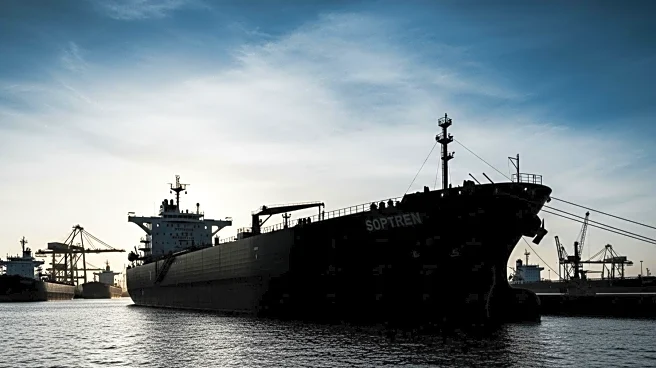What's Happening?
Terminal operators at Huangdao Port in China's Shandong province are set to introduce measures to ban vessels known as the shadow fleet, which transport oil under Western sanctions. The new regulations, effective November 1, will prohibit ships using fake International Maritime Organization numbers and those older than 31 years. This move follows the U.S. designation of a nearby oil terminal as receiving Iranian oil carried by sanctioned vessels. The measures are seen as a precautionary step driven by environmental concerns and rising U.S. sanctions pressure, although the latter is not explicitly mentioned in the notice. The terminal operators involved include Qingdao Haiye Oil Terminal Co, Qingdao Shihua Crude Oil Terminal Co, Qingdao Gangxin Oil Products Co, and Qingdao Lixing Logistics Co.
Why It's Important?
The implementation of these measures at Huangdao Port reflects the growing impact of international sanctions on maritime operations, particularly concerning oil transportation. By targeting the shadow fleet, China is addressing environmental risks and responding to geopolitical pressures, which could influence global oil trade dynamics. The move may affect the availability of older tankers, potentially increasing operational costs for oil traders and impacting the supply chain. As China is Iran's largest oil client, these measures could also affect bilateral trade relations and the broader geopolitical landscape, especially in light of ongoing tensions between Western countries and Iran.
What's Next?
The introduction of these measures may prompt other ports in China and globally to adopt similar regulations, potentially reshaping the maritime industry's approach to compliance and environmental standards. Stakeholders, including oil traders and shipping companies, will need to adapt to these changes, possibly seeking newer vessels to avoid restrictions. Additionally, the geopolitical implications could lead to further diplomatic discussions between China and Western nations regarding sanctions and trade practices.
Beyond the Headlines
The decision to ban the shadow fleet highlights the intersection of environmental concerns and international sanctions in maritime policy. It underscores the challenges faced by countries like China in balancing economic interests with compliance to global standards. This development may also encourage innovation in shipbuilding and maritime technology, as companies seek to meet stricter regulations and improve vessel safety and environmental performance.










